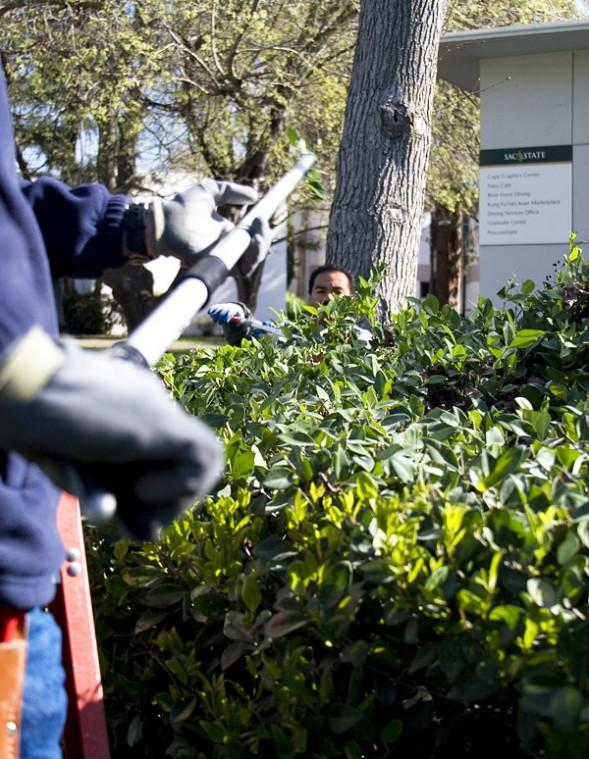Union sues CSU on wages
March 26, 2009
Facilities workers on campuses like Sacramento State may be getting a raw deal, according to a lawsuit filed against the California State University system.
The State Employees Trade Council-United filed the lawsuit alleging that the CSU violated the state education code by not paying its members at a rate required by law.
The union represents about 1,100 facilities workers throughout the CSU system, including carpenters, electricians, painters, plumbers, locksmiths and automotive and equipment mechanics, among others.
Last June, the contract detailing what the CSU system pays SETC-United members expired. A new contract has yet to be signed.
Under the California State Education Code Section 89517, the CSU cannot set the minimum salary below the prevailing wage rates as listed in the law.
Prevailing wages are described as the basic hourly pay rate on public works projects based on the type of work and the locality of the work, according to the California Department of Industrial Relations.
The prevailing wages for workers in San Francisco and Los Angeles are higher than the prevailing wages in Sacramento.
According to the education code, the CSU system can pay wages lower than the prevailing wage if a contract is signed between the system and the laborers, or a union sponsoring the workers.
SETC-United Business Manager John Connor said he wants union members to be paid fairly, and will use the law to do so.
“SETC has tried to bargain in good faith for over a year with no end in sight,” Connor said in a press release. “We have no choice but to fall back on the state education code requirement.”
SETC Labor Consultant Patrick Hallahan agrees. He said the CSU system needs to follow the law.
“If they want to bring someone in, I don’t care if it’s just for a day; they have to pay them by their trade described in the law,” Hallahan said.
According to a 2008 study sponsored by both the CSU system and the union, many SETC-United members’ salaries are below the prevailing wage rate for their trades.
Automotive and equipment mechanics are paid 6 percent less than average prevailing rate, locksmiths at 10 percent less and plumbers and electricians both at 7 percent less.
Those are just the average percentages found in the study. Hallahan said some union members are being paid 28 to 35 percent lower than the prevailing rate.
“It might not seem like a lot when someone is only $8 or $9 behind in their hourly pay,” Hallahan said. “But when it is expanded to months and years, the numbers really add up.”
CSU Chancellor’s Office Representative Teresa Ruiz said although it has not received the full lawsuit petition from SETC-United, it believes the lawsuit is without merit.
She said the CSU system has been complying with the education code and all of its contractual obligations.
“The parties have been negotiating a labor agreement, but have reached impasse and are currently in mediation,” Ruiz said. “These are difficult times, but we continue to be optimistic that ultimately the parties will reach an agreement.”
Sac State Associate Vice President for Public Affairs Gloria Moraga said the lawsuit is an issue for the CSU system as a whole, and it would not be appropriate for the university to make a lone comment at this time.
She did say the university supports the Chancellor’s Office’s stance.
Sac State SETC-United Representative Matt Mason, an automotive and equipment mechanic for the university, explained the events that led up to the lawsuit.
He said before the previous contract between the union and the CSU was going to expire in the summer, SETC-United completed a survey to find the prevailing pay rate in California to use for the new contract.
They found union members were being paid lower wages compared to five utility companies in California, including Pacific Gas and Electric and the Sacramento Municipal Utility District.
In terms of the prevailing wage calculated in the survey, carpenters were paid 8.9 percent less than the average utility wage, electricians 9.51 percent less and plumbers were 9.56 percent less.
Mason said the trustees and the Chancellor’s Office didn’t believe the numbers were correct, so they sponsored a study conducted by an independent analyst.
The study collected wage information from 33 public organizations and compared those with SETC-United union member wages to establish a prevailing pay rate.
The County of Sacramento, the City of Sacramento, the Sacramento City Unified School District and the Los Rios Community College District were included in the study.
The study found that many of the SETC-United members’ trade position wages did not meet the prevailing rate, but some workers were being paid by the prevailing wage rate.
According to the study, lead automotive and equipment mechanics are paid at their prevailing wage rate, while air conditioning and refrigeration mechanics are at 2 percent above the rate.
Michael Mette can be reached at [email protected].
















































































































































